Your Guide to Cracked Teeth
With their more sophisticated procedures, dentists are helping people keep their teeth longer, because people are living longer and more stressful lives, they are exposing their teeth to many more years of crack-inducing habits, such as clenching, grinding, and chewing on hard objects. These habits make our teeth more susceptible to cracks.
You’re probably reading this booklet because your dentist or endodontist has told you that you may have a cracked tooth. Cracked teeth show a variety of symptoms, including erratic pain when chewing, possibly with release of biting exposed to temperature extremes. In many cases, the pain may come and go, and the dentist may have difficulty locating which tooth is causing the discomfort.
Why Have I Been Referred to an Endodontist?
All dentists are trained in the diagnosis and treatment of cracked teeth in dental school. Some cracked teeth, however, can be especially difficult to diagnose, and treatment may involve root canal treatment. That’s why you have been referred to an endodontist.
Endodontists are dentists with at least two additional years of education that include the diagnosis and treatment of unusual dental pain. Cracked tooth pain often comes from damage to the inner soft tissue of the tooth, the pulp. Endodontic treatment, also known as root canal treatment, can relieve that pain.
Early diagnosis is extremely important. Like cracks in a windshield, cracks in teeth often start small and progress slowly. The sooner the crack is detected and treated, the better the chance of saving your tooth. The endodontist’s special training and experience can be valuable when a cracked tooth is suspected.
Why Does a Crack Tooth Hurt?
Type of Cracks
There are many different types of cracked teeth. The treatment and outcome for your tooth depend on the type, location and severity of the crack.
Craze Lines
Craze lines are tiny cracks that affect only the outer enamel. These cracks are extremely common in adult teeth. Craze lines are very shallow, cause no pain, and are of no concern beyond appearances.
Fractured Cusp
Cracked Tooth
Split Tooth
Vertical Root Fracture
Will My Tooth Completely Heal?
Unlike a broken bone, the fracture in a cracked tooth will never heal. In spite of treatment, some cracks may continue to progress and separate, resulting in loss of the tooth. Placement of a crown on a cracked tooth provides maximum protection but does not guarantee success in all cases.
The treatment you receive for your cracked tooth is important because it will relieve pain and reduce the likelihood that the crack will worsen. Once treated, most cracked teeth continue to function and provide years of comfortable chewing. Talk to your dentist and/or endodontist about your particular diagnosis and treatment recommendation. They will advise you on how to keep your natural teeth and achieve optimum dental health.

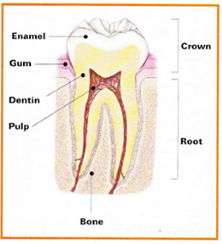
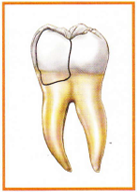
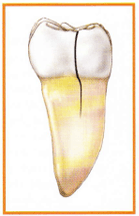
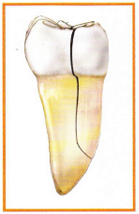
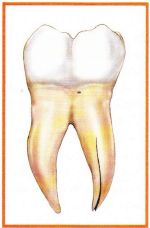


Share On: